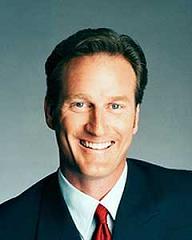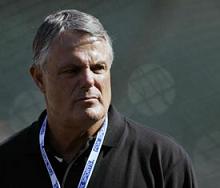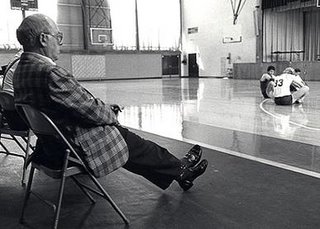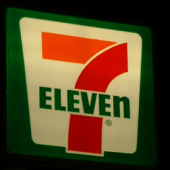
Fox Sports baseball broadcaster
Steve Lyons was fired immediately after Game 3 of the Oakland Athletics and Detroit Tigers ALCS for making what Fox deemed "
inappropriate comments" during the game. The 46-year-old Lyons, a first round pick of the Boston Red Sox back in 1981 who went on to a
nine-year MLB career as a utility player, made the objectionable comments during the following exchange, as recounted by Chris De Loduca of the
Chicago Sun-Times:
During Game 3 between the Oakland Athletics and Detroit Tigers, Lou Piniella compared the production from A's infielder Marco Scutaro to finding a wallet. Piniella later said the A's needed slugger Frank Thomas to get ''en fuego'' (on fire in Spanish) because he had been ''frio'' (cold). Lyons said Piniella was ''hablaing espanol'' -- butchering the conjugation for the Spanish word ''to speak'' -- then said, ''I still can't find my wallet. ... I don't understand him, and I don't want to sit too close to him now.''
I think going through each line might help assess whether Lyons indeed made racially-insensitive comments.
1) First we have 63-year old Lou Piniella, who is working the series for Fox and will likely take a big league managing job soon, comparing
Marco Scutaro's production (or lack there-of) to the luck of finding a wallet.
Interpretation: Piniella seemed to be saying that the A's getting production from Scutaro, a native Venezuelan with a lifetime MLB batting average of .258 and very little power, was as unlikely to happen as someone finding a wallet. Was Scutaro's ethnicity somehow related to Piniella's "finding a wallet" analogy? I doubt it, but perhaps Piniella should have used some other vehicle to make the point; racist or not, the "finding a wallet" expression isn't often used, and I suspect many of those listening found it a little odd.
 2)
2) Piniella then states that the A's needed Frank Thomas to get ''en fuego'' (on fire in Spanish) because he had been ''frio'' (cold).
Interpretation: Like many sportscasters, Piniella was using Spanish expressions to describe player performance. "En fuego" is regularly used to describe players playing so well that they are "on fire." Indeed, ESPN's
Dan Patrick and
Chris Berman have both made it a common expression in their on-air lexicon. "Frio" appears less commonly employed, perhaps because it's not all that endearing--the player is "cold" or in a slump--and sportscasters usually avoid critique in order to preserve good relationships with players. I don’t see the racist angle here, but if it's there, Piniella, rather than Lyons, said it.
3) Lyons then enters the conversation by stating that Piniella was "hablaing español."
Interpretation: Lyons was attempting to say, in some form of Spanish, that Piniella was "speaking Spanish," but he, like many middle schoolers, high schoolers, and college students trying to learn Spanish and perhaps even like
our supposedly but not quite "bilingual" President, messed up the verb conjugation of the verb "hablar" which means "to speak." To be correct, I believe Lyons should have said, "hablando español.” So it would seem that Lyons knew the correct verb--"hablar"--but didn't know how to conjugate it, so he added an "ing."
Should Lyons have refrained from using hablar without knowing how to conjugate it? Yes, because he sounded idiotic with millions of people listening. But was it insensitive? That's a harder call. I suppose you could say that Lyons, by adding "ing," was implying that he didn't need to know the correct Spanish, since he felt comfortable incorporating an English suffix into a Spanish verb, and we live in an English-speaking country that has become less and less tolerant of those who only speak Spanish or any non-English language. This is sort of the “
American Idiot” explanation, with Lyons as the intolerant American. Alternatively, maybe Lyons was just was being a dope, trying in humor to follow Piniella's lead by using Spanish, and had no racist/ethnic-phobic intent or even implicit attitude.
4) Lyons then says that "I still can't find my wallet. ... I don't understand him, and I don't want to sit too close to him now.''
Interpretation: By saying "I still can't find my wallet," Lyons may have been referring to the fact that he was a lousy hitter when he played in the big leagues from 1985 to 1993. A career .252 hitter with little pop, Lyons was better known for his on-field antics, such as when he dropped his pants at first base, or his penchant for the hidden ball trick. I guess you could say that he was a "throwback" of sorts, but I'm not sure which time in history that was. But in any event, Lyons was basically a goofy player--hence his nickname, "Psycho"--who couldn't hit, yet was affable and well liked by fans and teammates. Alternatively, Lyons may have simply been joking that Piniella had stolen his wallet.
The "I don't understand him," remark could suggest that Lyons realized, correctly so, that he didn't have a good grasp of the Spanish language. Or it could mean that he didn't understand Piniella's somewhat obscure wallet analogy.
The "I don't want to sit too close to him now," appeared to be a joke by Lyons of his co-broadcaster Piniella's use of the wallet analogy.
Conclusion: Lyons appeared to sound more stupid/goofy than racist, and I think his remarks were largely brought on by Piniella's weird remarks. Having said that, Lyons has
gotten himself into trouble in the past with his on-air comments. A couple of weeks ago, he regrettably said that a visually-impaired fan wearing special glasses has "got a digital camera stuck to his face," and two years ago, he was suspended for criticizing outfielder Shawn Green, who is Jewish, for sitting out a game on Yom Kippur. Lyons said: "He's not even a practicing Jew. He didn't marry a Jewish girl. And from what I understand, he never had a bar mitzvah, which is unfortunate because he doesn't get the money." But I'm not sure those two incidents make him more "guilty" in this instance.
Could Lyons sue Fox for wrongful discharge? I imagine he had a contract with Fox, rather than being an at-will employee, so without seeing the contract, it's not clear how much discretion Fox had in terminating him. However, absent express provisions to the contrary, a court would likely accord significant latitude to Fox in policing its on-air content.
Update: for another take on this story, see Paul Secunda's
thoughtful post on Workplace Prof Blog.
 Over the weekend of August 28th, our good friend and fellow sports law blogger Jeffrey A. Williams died suddenly of a subdural hematoma. He was only 26. A graduate of Columbia Law School and Columbia University, Jeff was a second-year attorney at the prestigious New York City law firm Milbank Tweed Hadley & McCloy, where he worked primarily on mergers, acquisitions, and other aspects of corporate governance. You may remember Jeff from his wonderful guest posts on Sports Law Blog, as they astutely examined the interaction of race, sports, and the law. For instance, he discussed the Duke lacrosse scandal (5/4/2006 & 5/7/2006), race and the NFL Draft (5/7/2006), liability of the fan who started the Pistons-Pacers fight in 2005 (5/7/2006), masculinity and boxing (5/4/2006), and World Cup politics (6/18/2006).
Over the weekend of August 28th, our good friend and fellow sports law blogger Jeffrey A. Williams died suddenly of a subdural hematoma. He was only 26. A graduate of Columbia Law School and Columbia University, Jeff was a second-year attorney at the prestigious New York City law firm Milbank Tweed Hadley & McCloy, where he worked primarily on mergers, acquisitions, and other aspects of corporate governance. You may remember Jeff from his wonderful guest posts on Sports Law Blog, as they astutely examined the interaction of race, sports, and the law. For instance, he discussed the Duke lacrosse scandal (5/4/2006 & 5/7/2006), race and the NFL Draft (5/7/2006), liability of the fan who started the Pistons-Pacers fight in 2005 (5/7/2006), masculinity and boxing (5/4/2006), and World Cup politics (6/18/2006).


















